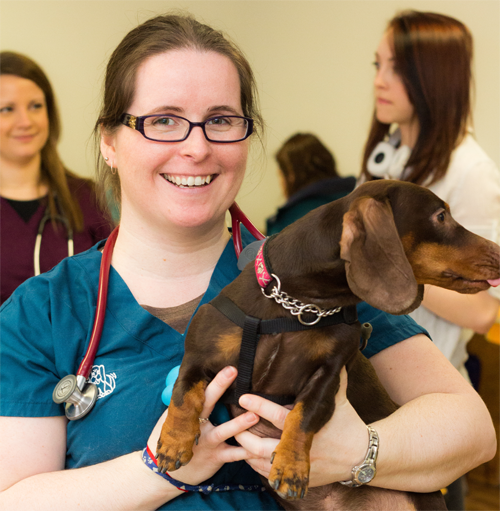
The next time you pick up after your dog, don’t forget to wash your hands. Dogs can carry harmful bacteria, such as Salmonella and Campylobacter, which can cause illness in humans, says Erin Leonard. A PhD graduate in Population Medicine, she recently completed her thesis on “Zoonotic Enteric Bacteria in Pet Dogs.”
“We don’t want people to be scared of dogs,” she says. “We just want them to practise good hygiene.” That includes washing your hands after handling dog feces and after preparing dog food that contains raw meat.
Salmonella and Campylobacter can cause gastrointestinal infections in humans. People with chronic diseases or compromised immune systems are at greater risk of developing these infections and related complications. Children under five, people over 65 and pregnant women are also more susceptible to infection.
More than 20 per cent of the dogs Leonard tested shed Salmonella in their feces. The bacteria can cause nausea, vomiting and diarrhea in humans; severe cases can cause septicemia, which requires hospitalization.
Dogs carrying these bacteria often don’t show symptoms, she says, but puppies, older dogs and dogs undergoing chemotherapy are more prone to getting sick. Contact with livestock is another potential source of infection for dogs.
Previous studies have shown that dogs that live together may transmit the bacteria to each other. “Either they’re shedding it and spreading it to each other, or they could have a common source that they’re getting infected with,” Leonard explains. Those sources could include contaminated food or water.
Feeding raw meat or eggs to dogs could also increase the Salmonella risk to humans. “If they’re fed it, they’ll shed it in their feces,” she says, adding that it’s important to wash your hands after cleaning up after your dog.
Raw beef, poultry, pork, fish and eggs have been shown to contain Salmonella. Washing hands after handling these foods and preventing cross-contamination to other foods and surfaces can help reduce infection rates. “There’s a possible association” between a dog being fed a raw food diet and human infection, she says, adding that thoroughly cooking meat before serving it to dogs can help lower the risk.
Leonard cautions dog owners against feeding their pet a raw food diet, because their dog can transmit bacteria to other dogs or to people at home or outside the home. She also doesn’t recommend feeding raw meat or eggs to puppies because of their underdeveloped immune system.
Raw food advocates believe the diet is more natural and healthier for dogs. “There’s not a lot of published research on that,” she says, adding that commercial pet foods are tested to be nutritionally balanced. “At home, you risk feeding an unbalanced diet – above the contamination risks.”
Although these germs can occasionally be transmitted orally, especially if the dog has recently eaten raw meat or eggs, she says the more likely source of transmission is through contact with the dog’s feces. “It’s something people need to think about.”
Some Salmonella and E.coli samples she collected from the dogs showed evidence of antimicrobial resistance.
Campylobacter was also found in more than 20 per cent of the dogs she tested and can often be traced back to raw poultry products. Campylobacter upsaliensis was the most common strain found in dogs tested for the study. Dogs that shed Campylobacter often don’t have symptoms, but people infected with Campylobacter jejuni face a higher risk of developing Guillain-Barré syndrome, a rare autoimmune disorder.
Leonard has personal experience with the canine germ. “Campylobacter jejuni is definitely capable of causing illness, even in reasonably healthy people,” she says. “I’ve had it myself.”
What’s her best advice for pet owners? “Hand hygiene, hand hygiene, hand hygiene,” she says. “Wash your hands after picking up after your dog and after feeding them and making their food.” She also recommends getting children into the habit of washing their hands after contact with animals.
After working in a small-animal practice for four years, Leonard discovered that many pet owners were unaware of the germs pets can carry, so she wanted to educate them.
“There are many benefits to having pets,” she says. “I would never discourage pet ownership.”